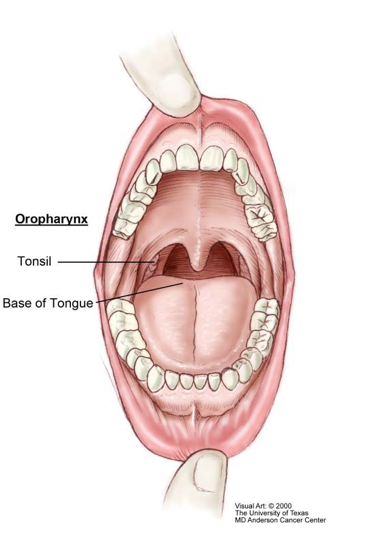 What Is Oropharyngeal Cancer?
What Is Oropharyngeal Cancer?
Cancer of the oropharynx is a type of head and neck cancer that includes the tonsils, the back of the mouth and the base of the tongue. When cancer is diagnosed in this area, it is called oropharyngeal cancer.
Most head and neck cancers begin in squamous cells. These cells line the moist areas of the head and neck, such as the inside of the mouth, nose and throat.
What Causes Oropharyngeal Cancer?
While cigarette smoking is still one of the main causes of head and neck cancer, there have been fewer cases in recent years.
Even though the number of head and neck cancers has decreased, oropharyngeal cancer is on the rise. Research studies have shown the human papillomavirus (HPV) can cause oropharyngeal cancer, especially in younger people who are at an increased risk for having the virus.
How Common Is Oropharyngeal Cancer?
The American Cancer Society estimates in 2015 about 15,520 people will get oropharyngeal cancer, and about 70 percent may be caused by HPV.
What Is the HPV Virus?
HPV is a group of common viruses that causes the growth of abnormal cells. In some cases, these abnormal cells become cancer. There are about 150 types of HPV. HPV spreads through skin contact. More than 30 types are transmitted through sexual contact, making HPV the most common sexually transmitted infection in the world. Most people are infected with HPV shortly after they start having sex. It can also be transmitted through oral sex and even deep mouth kissing.
The risk of HPV infection increases with:
- Every sexual encounter with a new partner.
- Having sex at an early age.
- Having sex with a partner who has had many partners.
Different types of HPV have different symptoms. Some types cause warts to grow on the hands and feet. Other types cause genital warts that are transmitted through sexual activity. The types that can cause cancer usually have no symptoms at all.
How Does HPV Cause Cancer?
HPV infects cells that line the inside of the body, such as the cervix and tonsils. Most people’s bodies are able to fight off an HPV infection. The infection can usually clear on its own within a year or two. Sometimes parts of the virus can remain for many years and cause abnormal cell growth that can lead to cancer.
Do I Have HPV?
A blood test is not available to check for HPV infection. For oropharyngeal cancer, cells from head and neck tumors that are removed during surgery or biopsy are tested for HPV. Testing positive for HPV in your tumor does not mean that the virus is active.
What Does Being HPV Positive Mean for Me?
If you have HPV-positive oropharyngeal cancer, you most likely got your infection many years before your diagnosis. Patients with HPV-positive oropharyngeal cancer tend to:
- Have better treatment results.
- Have less chance of the cancer coming back.
- Have a greater chance of going a longer time before the cancer returns.
- Survive their cancer longer.
How Do I Prevent HPV?
Three vaccines are available to protect young people from the types of HPV that can cause cancer: Gardasil®, Gardasil®9 and Cervarix®. Vaccines are recommended for girls and women at nine to 26 years of age and boys and men at nine to 21 years of age, before they become sexually active. The vaccines have been shown to be very safe and effective.
The vaccine prevents new HPV infections, but does not clear those already there or have any effect on invasive cancer.
